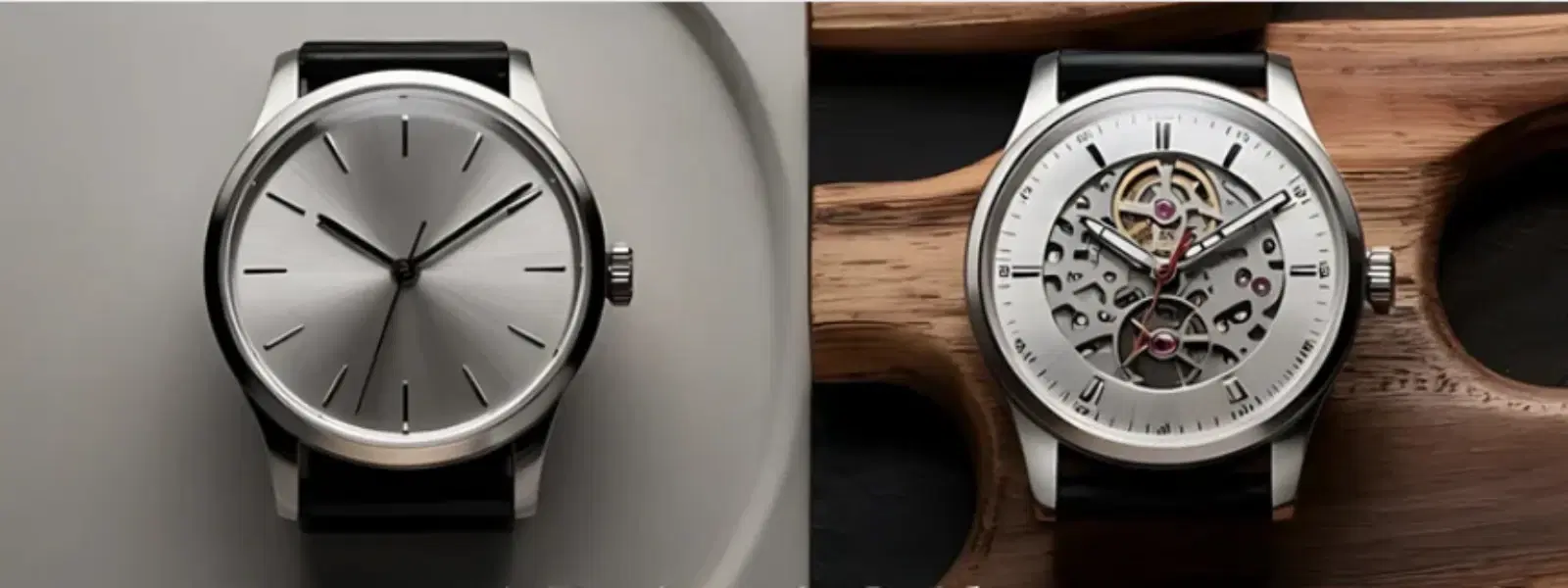
Watches & Jewellery
•04 min read

Choosing between mechanical and quartz watches can be a challenge, yet it is also an exciting journey of self-expression and style. In this guide, we explore the differences between mechanical watches vs quartz, so that whether you are a seasoned collector or a newcomer, you will have a clearer picture of what suits your lifestyle best.
Watch movements are the heartbeat of any timepiece, driving its function and character. Mechanical watches run on a mainspring that needs winding either manually or through wrist movement, a process that celebrates intricate craftsmanship. Conversely, quartz watches harness battery power combined with a quartz crystal to deliver a high degree of precision. Both movement types hold a special place in the world of analog watches and each has its own set of advantages that resonate with different lifestyles.
Understanding the core differences can help you decide. Mechanical watches need periodic winding or may use an automatic movement, making them a rhythmic companion that evolves with your day. Quartz watches stand out for their ease of use and remarkable quartz watch accuracy, boasting an electronic regulation system that makes them a solid choice for daily wear. While mechanical watches are appreciated for their luxurious craftsmanship, quartz watches are usually more accessible and practical due to their affordability.
When thinking about mechanical watch pros and cons, consider both the beauty and the maintenance requirements. On one hand, these watches are treasured for their sophisticated design, which speaks of meticulous engineering and timeless allure. They offer a unique sweeping motion of the second hand that many find mesmerizing, and their power is entirely generated without need for batteries. On the downside, they demand regular winding or movement, and mechanical watch maintenance, including service intervals every few years, is essential to keep them in top shape. While the commitment might be more intensive, many enthusiasts find the experience deeply rewarding.
Maintenance of mechanical watches is crucial to ensure longevity and precise performance. Here are a few tips to keep your timepiece thriving:
Use a watch winder for automatic models to keep the movement active.
Avoid exposure to strong magnetic fields that can interfere with the mechanism.
Schedule regular servicing every 3-5 years to preserve its intricate details.
These practices help maintain the reliability and legacy of mechanical watches, making them a cherished family heirloom for generations.

Quartz watches exhibit remarkable durability due to fewer moving parts and a design that favors resilience. This makes them an excellent choice for everyday wear. They stand out with high precision; quartz watch accuracy is a key advantage, with only minor deviations over extended periods. The simple requirement for battery changes every few years adds to their long-term convenience, making them a preferred choice for those who value practicality.
Considering the benefits and drawbacks of quartz watches paints a clear picture. On the plus side, quartz timepieces are affordable, lightweight, and require minimal maintenance, making them a practical choice for daily wear. Their design is sleek and efficient, ensuring they are resilient to shocks and vibrations. However, reliance on battery replacements and a comparatively simpler design might not evoke the same emotional connection as luxury mechanical watches. For buyers seeking a blend of style and utility, quartz watches offer a reliable alternative without the upkeep challenges of mechanical counterparts.
When it comes to longevity, both mechanical and quartz watches have their strong points. With regular mechanical watch maintenance, a mechanical timepiece can transcend generations, resonating with those who seek a watch that grows with history. Quartz watches, while incredibly durable, lend themselves to practical use and are often replaced as trends and preferences change. This automatic watches comparison highlights that the choice depends largely on whether you value tradition or modern ease.
Reliability is key in any accessory that guides your daily schedule. Mechanical watches, known for their intricate engineering, require periodic care for optimal performance, making them reliable when properly serviced. On the other hand, quartz watches stand out for their day-to-day dependability, offering consistent performance with minimal upkeep. In balancing mechanized charm with uninterrupted precision, this guide helps you weigh the mechanical vs quartz reliability based on your personal style and functional needs.

Your watch is not just a tool to tell time but a statement of identity. For those enchanted by the art of fine watchmaking, luxury mechanical watches represent a celebration of rich tradition and captivating design. In contrast, affordable quartz watches bring in the charms of minimal maintenance and sharp functionality suitable for everyday life. Understanding the analog watches differences helps you to match a watch that not only meets your technical requirements but also aligns with your fashion sensibilities and self-expression.
Breaking down analog watches differences underscores the unique appeal of each movement type. Mechanical analog watches captivate with their detailed craftsmanship and smooth, sweeping second hands that offer an almost hypnotic quality. Quartz analog watches, however, provide the edge of precise ticking and simplicity of design. Both styles cater to distinct tastes, leaving you with a vibrant range of choices aligning with both style and functionality.
Insight Corner: Why Craftsmanship Matters
Did you know? Mechanical watches often feature hundreds of tiny components, meticulously assembled by expert watchmakers. This level of craftsmanship not only enhances their aesthetic appeal but also makes them a symbol of timeless luxury.
Mechanical watches are cherished for their craftsmanship and traditional value, while quartz watches excel in precision and ease of maintenance.
Most high-end watches focus on mechanical movements, emphasizing automatic functionality and heritage.
Quartz watches require battery replacements and may lack the intricate craftsmanship of mechanical models.
With proper maintenance, mechanical watches can last for generations, whereas quartz watches are typically designed for everyday, practical use.
Choosing between mechanical and quartz watches is a balance of passion and practicality. Mechanical watches, with their intricate artistry and enduring legacy, appeal to those who value tradition and luxury. On the other hand, quartz watches offer modern precision and ease, making them perfectly suited for daily wear. By examining key factors such as watch movement types, durability, maintenance, and overall reliability, you can confidently select a timepiece that mirrors your individual style and lifestyle. This exploration into mechanical watches vs quartz illuminates the path to owning a watch that stands as a testament to your personal identity and fashion flair.